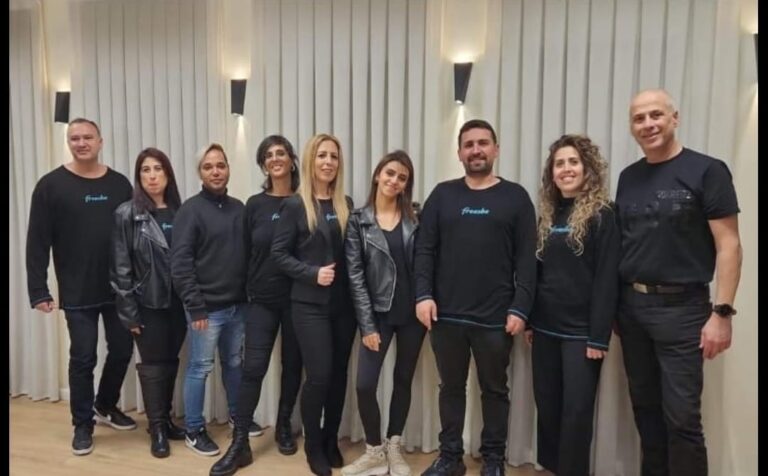
The workers’ union at the Freesbe Automobile Corporation, one of Israel’s largest car dealership groups, began last March with a Google search.
"One day less than a year ago, Dvorit called me and said, 'Limor, what do you think about forming a union?'" said Limor Seglovitch (47), manager of the rental and operations branch of Freesbe (formerly Carso Group) in Haifa and union chairwoman. "I told her, let's see what it is and I googled: what is a workers’ union? How do you establish a workers’ union?”
The move came in response to complaints about low wages, and a perception that the management was making unilateral decisions without workers’ input.
"I've been in this industry for 15 years, and I've already seen a lot of mergers and acquisitions,” Seglovitch continued. “I manage 20 employees in the company and feel their frustration and bitterness every day. They feel that they are not compensated enough. Their salary is too low, it’s hard to make them stay. But until that phone call, I didn't understand what a workers’ union was at all. I had only had a general idea, from what I had heard about in other companies. After some deliberation, we decided to go for it."
In a particularly quick move, the two, along with other members who joined the union, managed to sway hundreds of employees to join. Employees from different ranks, positions and levels of seniority came together to form the union under the Histadrut’s guidance, leading the automobile giant that employs 1,400 people into the world of unionized labor.
"I felt it was our responsibility to society"
Aviran Ben Abu (40), a second-hand car sales representative at the Kochav Yair branch of Freesbe, has been working for the company for five years. He heard about the union on the same morning they began the process of organizing, and immediately asked to join the leadership committee.
"I was already in a dilemma about continuing to work at the company, since they worsened my working conditions,” he said. “But as soon as the organizing began, I decided that I would stay and fight for this workplace, which I love."
Ben Abu says that he came to Freesbe from the cellular sector, where he worked in two different companies that have unions.
"I knew how it felt to have a union that looks after you and makes sure that there are no unilateral changes in the company. This was lacking in Freesbe, so I immediately jumped at the opportunity and wanted to be a part of this move,” Ben Abu explained. “I remember talking to one of my colleagues a year ago, and I told him that there must be a union established here and that there needs to be someone to protect our rights."
Dvorit Siloni (37) has been working for the company for 17 years, and currently works in the sales department. She is a co-founder of the union.
"I felt that this is something we owe to society, that it should have happened a long time ago” she told Davar. “This feeling was strengthened in me by the COVID pandemic, which greatly affected the automotive industry – both during COVID and after it when there was a crisis of importing vehicles to Israel. It affected society and every one of us.
“The feeling was that the company saw itself but not always us, the workers,” Siloni added. “I experienced a significant hit to my wages, and I knew that if we had been unionized it would have been different. We would probably have been hurt less and above all, they would have talked to us."
Eitan Nimkovsky (62) has been working in the automotive industry since 1987, and has been working in the Carso Group for almost a decade as a service consultant. He currently serves as the manager of the business department as well.
"The reason why I went ahead with this move is because on the one hand it is a good, successful company, and on the other hand there are huge gaps between the management level and the production floor,” he said. “I have no complaints about how much the vice president earns, but in a company, an ordinary employee is also profitable. You should earn according to how much the company earns.”
“Unfortunately, there are people here who work very hard and give their heart and soul, and the feeling is that they are not properly rewarded,” Nimkovsky continued. “Since we are a public company, everything is exposed, and when you see it, it's jarring."
"We went for it together, and got it done"
In January, the Carso Group announced a rebranding move, and the unification of all companies and services under the Freesbe name.
"They held a huge event, gathered 1,500 employees for a conference in the middle of the work day. They physically closed the company for one day," Nimkovsky said. "The entire move was not completely clear and raised concerns among the employees, and mainly there was a feeling that we were being informed of a very significant move that hadn’t been discussed with us."
After the conversation between Siloni and Seglovitch, they turned to the Histadrut.
"We started to gather an initial group of people, to establish the worker’s union," Seglovitch explained. "We met a lot with the guys from the department for workers' unions, and with attorney Tali Greenberg, the director of the division from the transport workers' union which oversees us. The Histadrut constantly gave us support and a lot of professional assistance."
Seglovtich explained that she had some doubts in the beginning, mainly that the process would lose momentum. From this fear, she decided not to tell her family so that they wouldn’t talk her out of it.
“But in the end, from the moment we decided together to go for it, I told myself that there is nothing to fear from here, we have to dive into the water,” she said. "The day before [we went public] with our organizing, there were two members of the action committee who got cold feet and told me, ‘we are not capable.' It was unimaginable stress. But the group that formed strengthened each other, and in the end they too came to their senses and acted with us. We went for it together, and we got it done."
"This job is a very important part of my life. I studied here for my degree, met my husband, had my kids here. I have a family at home and a family at work, that's how it feels to me. So of course it's scary to rock the ship. There was fear,” Siloni added.
She explained that the Histadrut representatives helping them unionize “prepared us for the fact that it would not be easy – everything they said really happened in the end exactly as they said it would.” Siloni also said that her husband, who had formerly worked at Freesbe, gave her moral support, “a necessary thing when you attempt a project like this."
"For me, precisely because the company is so important to me,, I knew I had a lot to protect and defend, along with everything I had to lose,” she said. “It was clear to me that I had to stand up here and represent [the union]. It can't be that so many good employees are leaving. I have many friends and a family who work in unionized companies and I saw how the employee is treated, how people can walk with their heads held high.”

Siloni says that they worked through their concerns together as a group.
"We always believed inside that it would succeed,” she said. “We would meet together at Cafe Gan Sipur, the old core of the movement, and discuss the concerns. We strengthened each other."
“They know that there is someone on their side”
When the day came to unionize, the team was prepared with a precise plan of action. Committee activists were divided into teams that went out to meet the workers and sign them up for membership in the Histadrut in all the branches, while at the same time a telephone call center was established in the Histadrut building.
"It was crazy," Siloni recalled. "I'm so happy that I got to take part in such an event. Within a few hours, there was a mass joining of hundreds of employees, and we reached our goal for representation."
Seglovitch explained that at this stage, the union is in negotiations with management to promote their collective agreement, but the union has already become a fact on the ground.
“For example, we have already started to help employees who received hearings. We prepared them before the hearing and we sat with them at the hearing itself,” she said. “It's a completely different feeling of security when you're not alone in front of the system, but a union representative and a lawyer from the Histadrut are with you."
"From the moment the union was announced, people started calling us about anything and everything, which is an amazing thing,” Nimkovsky added. “They ask questions that they had no one to ask before. They know that there is someone who cares about them now, there is someone who will find out for them, there is someone who is on their side."
"We received a lot of [positive] feedback from employees of the company and even from employees who no longer work with us,” Siloni said. “The phone didn't stop ringing and everyone praised us for the move, congratulated us and gave us encouragement."
"We are not alone"
Seglovitch explains that even the workers' union itself always has Histadrut resources to call on: attorney Tali Greenberg from the Transport Workers' Union, Rom Dvir and Dana Bar Lev from the Department for Workers' Unions, attorney David Pertiali from the Ashdod sector, and more.
Seglovitch said that it is a big transition for her to be negotiating with management when just three months ago, she was asked to speak on their behalf at the rebranding event.
“Obviously, there is also tension and complex emotions about the fact that I led this process of unionization,” she said. “But it is always important to me to say that such a move is made only by those who care about the company and the workplace. A workers' union is a force that comes to improve a company, not to be against the management.”
"So far, several meetings have already taken place. We are constantly in dialogue with workers on the ground to understand the needs of the employees and to bring them up at the negotiation table. It is important for us to come to the meetings prepared, so that the management knows that sitting in front of them is a strong, determined team that loves the company and loves its employees,” Seglovitch continued.
Ben Abu added that "our job is to bring the workers to the table, so I am not ashamed to present our demands, which are fair demands."
Nimkovsky explained that until this point, the company’s management has been seen “as a kind of unapproachable echelon about which they hear rumors. Maybe they will do it this way, maybe that way.”
“But the workers on the ground, they want to be talked to and they want certainty,” he said. “It is not necessarily easy to sit in front of senior managers, but we know and feel that behind us there is a public of employees who expect things from us, and that in the company there must be reciprocity and adequate compensation."
“I believe that in the end it will be an excellent agreement for the employees we represent, and I hope for a fruitful dialogue with the management,” Siloni said. “This will allow for Freesbe, which is so dear to our hearts, to march forward and develop."
This article was translated from Hebrew by Etz Greenfeld.






